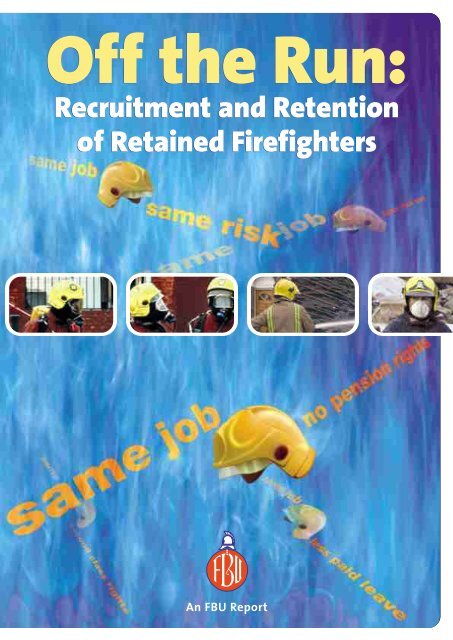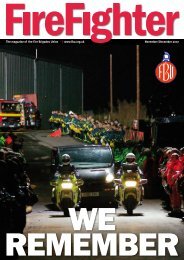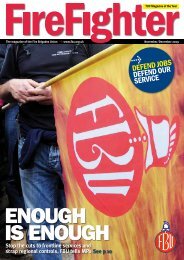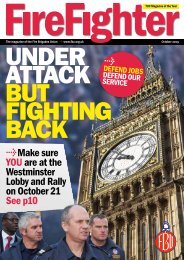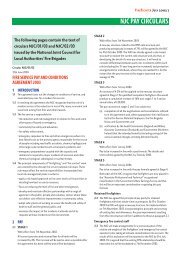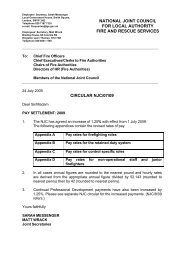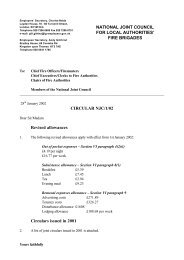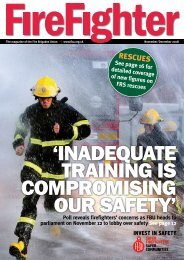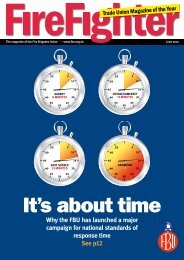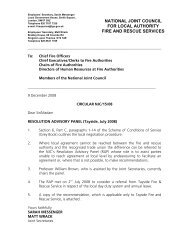Off the Run - Fbu.me.uk
Off the Run - Fbu.me.uk
Off the Run - Fbu.me.uk
You also want an ePaper? Increase the reach of your titles
YUMPU automatically turns print PDFs into web optimized ePapers that Google loves.
There is no separate funding for <strong>the</strong> Retained Duty System of The Fire and Rescue Service.Where Fire Brigades have had to make cuts in level of service provided to <strong>the</strong> public in recent years,<strong>the</strong> Retained Duty System of The Fire and Rescue Service has not been exempt.If <strong>the</strong> Fire Service is to continue to benefit from <strong>the</strong> contribution of Retained Firefighters,substantial additional funding will be vital to overco<strong>me</strong> recruit<strong>me</strong>nt and retention problems. The idea,advanced recently by <strong>the</strong> Local Govern<strong>me</strong>nt Association (LGA) that so<strong>me</strong> re<strong>me</strong>dies to <strong>the</strong> problem canbe at low or no cost – a view apparently shared by so<strong>me</strong> o<strong>the</strong>r organisations involved in <strong>the</strong> debate aboutrecruit<strong>me</strong>nt and retention – is a fantasy.The retained workforceThe latest figures for 2003-4 suggest that<strong>the</strong>re are an estimated 18,259 Firefightersworking on <strong>the</strong> Retained Duty System,(CIPFA/IPF). This compares with an estimatedoverall Wholeti<strong>me</strong> strength of 38,845 (includingall ranks from Firefighter to Chief Fire <strong>Off</strong>icer).Retained Firefighters account for over 30% of <strong>the</strong>total operational workforce of England and Walesbut are responsible for operating 60% of pumpappliances.There are Retained Firefighters in all but twoof <strong>the</strong> Brigades in <strong>the</strong> UK. Their numbers varyaccording to <strong>the</strong> historic risk categories of aBrigade. In Nor<strong>the</strong>rn Ireland <strong>the</strong>re are nearly1,000 Firefighters on <strong>the</strong> Retained Duty System,and in Scotland over 2,800, but in London andMerseyside <strong>the</strong>re are none.“While we’re struggling with half a dozen people to keep <strong>the</strong> pumpon <strong>the</strong> run, <strong>the</strong>y’re happy because <strong>the</strong>y are saving money, and<strong>the</strong>y’ve still got a pump that drives around occasionally. So as faras statistics are concerned <strong>the</strong>y’ve still got a Fire Station open.– Berkshire FirefighterIt’s about ti<strong>me</strong> that our employers took <strong>the</strong> shortage of Firefightersworking <strong>the</strong> Retained Duty System more seriously. It is regularoccurrence in my Brigade that <strong>the</strong>re can be up to 10 retained pumpsoff <strong>the</strong> run during <strong>the</strong> dayti<strong>me</strong>. If <strong>the</strong> public knew about this <strong>the</strong>nI am sure that so<strong>me</strong>thing would be done about it. For a start <strong>the</strong>yshould have an annual budget for recruit<strong>me</strong>nt and not leave it to<strong>the</strong> people on Station to try and recruit.– So<strong>me</strong>rset FirefighterThe Retained Duty System is <strong>the</strong> most widelyused pattern of work in <strong>the</strong> Fire and RescueService, if <strong>the</strong> number of Stations where it isworked are counted. Fire service establish<strong>me</strong>ntreturns for 2002 show that in England, Wales and Nor<strong>the</strong>rn Ireland 896 Stations are crewed byRetained Firefighters, as against 609 crewed by Wholeti<strong>me</strong> shift workers. Of <strong>the</strong> 609 shift Stations,161 also had Retained staff – proving incidentally that Retained and Wholeti<strong>me</strong> FBU <strong>me</strong>mbers workside by side whenever it is practical.In Scotland <strong>the</strong>re are 182 Retained stations, 75 Whole-ti<strong>me</strong> and 132 Volunteer stations (locatedmainly in Strathclyde, and in <strong>the</strong> Highlands and Islands which account for 5% of <strong>the</strong> population but40% of Scotland’s land mass).There are five o<strong>the</strong>r work patterns in use within <strong>the</strong> Fire and Rescue Service, but none of <strong>the</strong>m areused as widely and only two out of 58 UK Fire and Rescue Authorities use all seven. The image of‘inflexibility’ applied to <strong>the</strong> Service in general and <strong>the</strong> FBU in particular during our campaign for betterpay is unwarranted.An FBU Report5
●●●●●●●●Fewer self-employed people seem to be available to work as Retained Firefighters, again due toeconomic pressures and low levels of remuneration in <strong>the</strong> Fire and Rescue Service.Lack of transparent/fair recruit<strong>me</strong>nt policies and procedures.The need to make <strong>the</strong> Duty system more ‘family friendly’ and reflect <strong>the</strong> diversity of <strong>the</strong>communities we serve.Lack of invest<strong>me</strong>nt in Retained Station buildings/facilities.Poor remuneration for commit<strong>me</strong>nt to availability.Lack of manage<strong>me</strong>nt training of Station personnel on all levels/roles: ‘people manage<strong>me</strong>nt’ skills,public relations, fairness at work, diversity.Very limited scope for personal and career develop<strong>me</strong>nt within <strong>the</strong> Retained Duty System of <strong>the</strong>Fire and Rescue Service.The perception of <strong>the</strong> work of Firefighters on <strong>the</strong> Retained Duty System is not matched by <strong>the</strong>reality.These problems are not new, but up to now have generally not been addressed by <strong>the</strong> employers or<strong>the</strong> Govern<strong>me</strong>nt. They stem from:●●●●●Lack of understanding of <strong>the</strong> Retained Duty System.Lack of interest and commit<strong>me</strong>nt by Govern<strong>me</strong>nt, ODPM, Fire Authorities, Chief Fire <strong>Off</strong>icers,Firemasters.Resistance to diversity issues.Lack of adequate sustainable funding into <strong>the</strong> Retained Duty System of <strong>the</strong> Fire and RescueService.Lower establish<strong>me</strong>nts <strong>me</strong>an Fire Authorities save money – ‘Retained on <strong>the</strong> cheap . . . andcheaper still’.The problem of appliances “off <strong>the</strong> run” because of staff shortages is now being picked up by <strong>the</strong> <strong>me</strong>dia:●●In Essex, <strong>the</strong> Herts and Essex Observer reported recently that Retained Firefighters from <strong>the</strong> ThaxtedFire Station in Essex have been “off <strong>the</strong> run” and are desperately appealing for new recruits. LeadingFirefighter Steve Morris told <strong>the</strong> Observer: “We are actually starting to miss calls now, which isreally quite frightening”. Work commit<strong>me</strong>nts, individuals moving out of <strong>the</strong> village, holidayplans, an impending retire<strong>me</strong>nt, lack of local industry and increased commuting are <strong>the</strong> familiaringredients in this story.In Newcastle, <strong>the</strong> Sentinel reported that <strong>the</strong> local Fire Station was “regularly one engine short”.In this case it is Wholeti<strong>me</strong>rs on a variable crewing system who are one crew down, but increasedreliance on Retained personnel, <strong>the</strong>mselves “50% short” was expected to take its toll.An FBU Report7
promoting <strong>the</strong> serviceNot enough is being done to promote <strong>the</strong> Retained Duty System to <strong>the</strong> public in general, toemployers and to employees, self-employed and unemployed as potential recruits. The FBU believesthat national initiatives are needed to overco<strong>me</strong> this.Four years ago <strong>the</strong> FBU in Nor<strong>the</strong>rn Ireland beca<strong>me</strong> involved in a new initiative with <strong>the</strong> FireBrigade. There had been serious difficulties in getting people to co<strong>me</strong> forward as applicants for <strong>the</strong>Retained Service. In several one-pump Stations <strong>the</strong> Brigade advertised vacancies and actually got noapplicants. They ended up having to put in Retained Firefighters on a day-watch system – paid a day’spay to go and stand by, at considerable cost.“Most of <strong>the</strong> people in my village realise that <strong>the</strong>re is a Fire Station in<strong>the</strong>ir community but few appreciate how <strong>the</strong> fire appliance is crewed.The number of ti<strong>me</strong>s <strong>me</strong>mbers of <strong>the</strong> public have knocked on <strong>the</strong> FireStation door to thank <strong>the</strong> Firefighters for <strong>the</strong> job <strong>the</strong>y do only to besurprised that <strong>the</strong> fire engine is <strong>the</strong>re but no Firefighters.– Strathclyde FirefighterThe Union argued that <strong>the</strong> Brigade wasbeing more rigid than it needed to indistributing application forms (taking fairemploy<strong>me</strong>nt legislation into account).Recruit<strong>me</strong>nt materials were changed from just aform to a whole ‘pack’, and put into places likelibraries and health centres, in two districts. Theinitiative made a significant impact andeventually secured sufficient recruits. TheBrigade has now taken this fur<strong>the</strong>r and it hasbeen successful.public perceptionIn <strong>the</strong> eyes of <strong>the</strong> public, <strong>the</strong> Retained DutySystem of <strong>the</strong> Fire and Rescue Service is nodifferent to that of <strong>the</strong> Wholeti<strong>me</strong> Duty System.The appliances are <strong>the</strong> sa<strong>me</strong> and <strong>the</strong> fire fightingprotective clothing is <strong>the</strong> sa<strong>me</strong>, and both carryout <strong>the</strong> sa<strong>me</strong> duties at incidents.Accordingly <strong>the</strong> public expect <strong>the</strong> best fro<strong>me</strong>very <strong>me</strong>mber of <strong>the</strong> Fire and Rescue Service, <strong>the</strong>professional expertise and courage that are <strong>the</strong> hallmarks of <strong>the</strong> UK Fire and Rescue Service. Sadly anumber of Firefighters on <strong>the</strong> Retained Duty System have died in service. The commit<strong>me</strong>nt expectedfrom Retained Firefighters is enormous considering <strong>the</strong> levels of training and remuneration <strong>the</strong>y receive.It is <strong>the</strong> view of <strong>the</strong> FBU that in both <strong>the</strong> areas of training and remuneration very much more needsto be done in <strong>the</strong> interests of expertise and safety and <strong>the</strong> status of <strong>the</strong> Retained Duty System.8<strong>Off</strong> <strong>the</strong> <strong>Run</strong>: Recruit<strong>me</strong>nt and Retention of Retained Firefighters
employersA lot of Retained Firefighters have <strong>the</strong> co-operation of <strong>the</strong>ir employers but more can and shouldbe done to promote <strong>the</strong> Retained Duty System and Fire Service. It’s ironic that <strong>the</strong> Govern<strong>me</strong>nt talksabout community initiatives but when it co<strong>me</strong>s to employers releasing Firefighters for <strong>the</strong> community<strong>the</strong>re is no incentive for <strong>the</strong>m to do it whatsoever. There will be costs involved in any promotion of <strong>the</strong>Service, but <strong>the</strong> long term cost of under-recruit<strong>me</strong>nt is greater.A 2002 report by <strong>the</strong> HM Fire Service Inspectorate for Scotland (HMFSI) called for a morepro-active approach to local employers, and public recognition of <strong>the</strong>ir contribution (Retained, AuxiliaryAnd Volunteer Firefighters in <strong>the</strong> Scottish Fire Service.) It said rebates on business rates or pay<strong>me</strong>nt for ti<strong>me</strong>lost could be considered. Brigades and local authorities could set an example by encouraging <strong>the</strong>ir ownstaff to be rural and retained Firefighters.●The Govern<strong>me</strong>nt (ODPM) must ensure thatpublic services and groups like <strong>the</strong> Businessand Community Safety Forum (BCSF) areaware of <strong>the</strong> Retained Duty System and itsbenefits to local businesses; and encourage andsupport employers in releasing employees tocarry out Retained duties.“I think that <strong>the</strong> employers have to be recognised. So<strong>me</strong>one from <strong>the</strong>Fire Service actually has to go and see those employers to see if <strong>the</strong>ycan persuade <strong>the</strong>m. I am sure if you work around so<strong>me</strong>one’s workschedule, for instance so<strong>me</strong>one working in Tesco’s stacking shelves,why could he not be released? But nobody actually goes to see <strong>the</strong>m.●●Nationally and at Brigade level <strong>the</strong>re must bebetter engage<strong>me</strong>nt with <strong>the</strong> businesscommunity. There is a considerable variationin <strong>the</strong> support received from <strong>the</strong> businesscommunity for releasing employees to carryout Retained duties, despite <strong>the</strong> manybenefits of having Retained Firefighters on<strong>the</strong> payroll with a large range of transferableskills.The ODPM, Chief Fire <strong>Off</strong>icers and FireAuthorities must engage effectively with localemployers to dismantle barriers and overco<strong>me</strong>reluctance to release staff, with localmanage<strong>me</strong>nt “<strong>me</strong>eting <strong>the</strong> people”.– Devon employer of Retained Firefighters(Hansard: House of Commons Housing, Planning, LocalGovern<strong>me</strong>nt and <strong>the</strong> Regions Committee, 21 October 2003)We think once a year <strong>the</strong>y could get in contact with <strong>the</strong> employer– at least a corporate Christmas card – but <strong>the</strong>y don’t even do minorthings like that .– Nor<strong>the</strong>rn Ireland Firefighter●●We should consider offering induce<strong>me</strong>nts through financial incentives (tax/business rate benefits,insurance discounts) and/or local recognition for rendering service to <strong>the</strong> community. This couldbe ei<strong>the</strong>r nationally through employers’ organisations or on a more local basis, or both.Brigades should be inviting employers to open-days and public exercises, to see <strong>the</strong> work of <strong>the</strong>Fire Brigade. O<strong>the</strong>r practical steps, like sending a copy of <strong>the</strong> Brigade’s annual report to employersto let <strong>the</strong>m see <strong>the</strong> activities of <strong>the</strong> Brigade – with particular emphasis on <strong>the</strong> role of <strong>the</strong> RetainedFirefighters.An FBU Report9
The develop<strong>me</strong>nt of career forums, as used in o<strong>the</strong>r branches of <strong>the</strong> public services (nurses, specialconstables, teachers and also <strong>the</strong> territorial army) would help <strong>the</strong> Service attract more employedapplicants.Changes in patterns of employ<strong>me</strong>nt have made it more difficult to recruit, with a dramatic declinein manufacturing jobs. In response <strong>the</strong> govern<strong>me</strong>nt argues that for every manufacturing job lost in <strong>the</strong>UK, two new jobs have been created elsewhere in <strong>the</strong> economy. The Fire and Rescue Service mustbroaden and update its recruit<strong>me</strong>nt strategies in order to connect with <strong>the</strong>se new employers.Self-employed people have traditionally played an important role on <strong>the</strong> Retained Duty system.Numbers of self-employed rose during 2002 and 2003 to nearly 3.4 million, with skilled trades,professional and technical occupations registering <strong>the</strong> highest increases. But it seems to be moredifficult to attract <strong>the</strong>m to <strong>the</strong> Fire and Rescue Servicethan it used to be and greater remuneration oro<strong>the</strong>r incentives from Govern<strong>me</strong>nt need to beoffered.“Employ<strong>me</strong>nt has shifted to service-based organisations which aren’trun locally. The Roads depart<strong>me</strong>nt could be controlled from Aberdeenyet <strong>the</strong> person lives in Banff so <strong>the</strong>re’s not <strong>the</strong> sa<strong>me</strong> local identity.– FBU ScotlandMost of <strong>the</strong> employers of potential retained Firefighters haven’t got aclue about <strong>the</strong> Retained Duty System. So is it surprising <strong>the</strong>n that<strong>the</strong>y are reluctant to release <strong>the</strong>ir employees to carryout firefightingduties. <strong>Off</strong>icers from <strong>the</strong> Brigades should visit <strong>the</strong> employers andexplain <strong>the</strong> Retained Duty System.– Avon FirefighterUnemploy<strong>me</strong>nt is lower than it used to bebut pockets of high unemploy<strong>me</strong>nt still exist at alocal level in so<strong>me</strong> areas of <strong>the</strong> country. To retainand extend <strong>the</strong> use of unemployed people in <strong>the</strong>Retained Duty System of <strong>the</strong> Govern<strong>me</strong>nt mustrethink its Benefits System policies to make aRetained post in <strong>the</strong> Fire and Rescue Servicemore worthwhile.The Jobseekers Allowance (JSA) is oftencited as one of <strong>the</strong> barriers to Retainedrecruit<strong>me</strong>nt. Unemployed Firefighters working<strong>the</strong> Retained Duty System claiming JSA have<strong>the</strong>ir earnings from fire fighting deducted from<strong>the</strong>ir allowance.Currently Firefighters can earn up to £20.00(compared to o<strong>the</strong>r groups who receive a £5.00‘disregard’) without losing any of <strong>the</strong>ir benefit. But<strong>the</strong> ODPM should apply pressure to <strong>the</strong> Depart<strong>me</strong>nt for Work and Pensions (DWP) and assist <strong>the</strong>m inputting a case to Ministers to change <strong>the</strong> legislation and increase <strong>the</strong> allowance fur<strong>the</strong>r.The DWP itself should ensure that information/advice is issued to all local employ<strong>me</strong>nt officesreminding <strong>the</strong>m of <strong>the</strong> present preferential ease<strong>me</strong>nts that Retained Firefighters should receive. TheFBU does not accept figures suggesting that numbers of ‘claiming’ Firefighters are insignificant, since<strong>the</strong>y do not show how many have been deterred from applying.10<strong>Off</strong> <strong>the</strong> <strong>Run</strong>: Recruit<strong>me</strong>nt and Retention of Retained Firefighters
Recruit<strong>me</strong>ntA lack of recruit<strong>me</strong>nt activity in many areas is one of <strong>the</strong> key problems. Local recruit<strong>me</strong>ntcampaigns have been poorly funded and organised. Commit<strong>me</strong>nt to regular campaigns have beeninfrequent and half hearted.As a result, <strong>the</strong> Service relies heavily on <strong>the</strong> activities of Firefighters <strong>the</strong>mselves to attract potentialnew recruits, a fact confir<strong>me</strong>d by Scottish HMSFI 2002 report. Without that commit<strong>me</strong>nt staffing levelswould be even worse but over-reliance on this process has potential problems from an equalityperspective.A properly funded and well thought out National Recruit<strong>me</strong>nt Campaign is needed. We need toadvertise <strong>the</strong> Retained Duty System via centrallyproduced and strategically approached nationaltelevision advertising, national radio, nationalpress, wo<strong>me</strong>n’s magazines, and national leaflets.For <strong>the</strong>re to be more effective recruit<strong>me</strong>nt to<strong>the</strong> Service, Brigades <strong>the</strong>mselves must begenuinely committed to expanding <strong>the</strong> number ofFirefighters on <strong>the</strong> Retained Duty System.The Fire Service must be made moreattractive to potential recruits and a willingness toadapt <strong>the</strong> Retained Duty System and <strong>the</strong> level ofcommit<strong>me</strong>nt can only help. This is why <strong>the</strong>reduction in <strong>the</strong> level of cover required nationallyto 120 hours is important. It is no good ‘blaming’young recruits, for example, for beinginsufficiently committed. Increased recruit<strong>me</strong>ntwould itself allow <strong>the</strong> demands of <strong>the</strong> job to beshared amongst a greater number of Firefighterson <strong>the</strong> Retained Duty System.“The only recruit<strong>me</strong>nt drives that go on are what we do ourselves.– Berkshire FirefighterThe fire service will have to compete against a wide range oforganisations, including those in <strong>the</strong> public and voluntary sectors,if it wants to attract <strong>the</strong> attention of potential recruits. In 200385% of organisations experienced recruit<strong>me</strong>nt difficulties including90% in public sector services and 92% in voluntary, community andnot-for-profit organisations.– Chartered Institute of Personnel &Develop<strong>me</strong>nt (CIPD):Recruit<strong>me</strong>nt, retention and turnover 2004People join <strong>the</strong> service on <strong>the</strong> Retained Dutysystem to help <strong>the</strong> community, do so<strong>me</strong>thingworthwhile and gain new skills, according to <strong>the</strong> Scottish HMSFI 2002 report. The aim of fulfilling along-held ambition is ano<strong>the</strong>r factor, as is money while for so<strong>me</strong> it is a stepping stone to <strong>the</strong> Wholeti<strong>me</strong>service. Difficulties with <strong>the</strong>ir main employ<strong>me</strong>nt, and “concerns that <strong>the</strong> Brigades appear to do littleto help in <strong>the</strong>se situations” were barriers for so<strong>me</strong>.The report noted that recent leavers experience regret at leaving, and it may be worth investigating<strong>the</strong> approach taken by Surrey Police who routinely contact leavers 12 to 18 months after <strong>the</strong>y have leftto ask if <strong>the</strong>y would like to return (IDS Studies 751 June 2003: Recruit<strong>me</strong>nt practices).An FBU Report11
ecruit<strong>me</strong>nt proceduresApplicants wanting to join <strong>the</strong> Fire Service have to pass a number of tests, as well as a <strong>me</strong>dicalassess<strong>me</strong>nt. From 25 March 2004 this year new Appoint<strong>me</strong>nts and Promotion Regulations have been in forceand make no distinction between Wholeti<strong>me</strong> and Retained Firefighters.Whatever <strong>the</strong> level of recruit<strong>me</strong>nt activity, if <strong>the</strong> process of joining <strong>the</strong> Fire Service is not handledproperly a huge ‘wastage’ of potential recruits can occur.Needless delays for four, five or six months can only make matters worse. There is a lengthyrecruit<strong>me</strong>nt processing caused by Fire and Rescue Services wanting to wait until <strong>the</strong>re areenough candidates to test at any one ti<strong>me</strong> in order to make <strong>the</strong> process cost-effective can lead to loss ofpotential recruits.Retained Firefighters believe that <strong>the</strong>y cancontribute to a higher success rate in <strong>the</strong>“If we know about it <strong>the</strong>n we can get <strong>the</strong>m on <strong>the</strong> Station, we can give<strong>the</strong>m so<strong>me</strong> training, access training, hose running. People are failingon this simply because its <strong>the</strong> first ti<strong>me</strong> <strong>the</strong>y’ve ever picked up a pieceof hose. They end up in a big bunch of spaghetti and that’s it, <strong>the</strong>y fail<strong>the</strong> test.– Berkshire Firefighter“The employers don’t really want to know. They’re extre<strong>me</strong>lyreluctant to engage in any sort of recruit<strong>me</strong>nt to <strong>the</strong> extent that <strong>the</strong>next planned retained training is scheduled for next April. So even ifwe recruited so<strong>me</strong>one tomorrow <strong>the</strong>y’ve got to wait until <strong>the</strong>n, <strong>the</strong>nthree months on it’ll be July before we actually get bums on seats”.– Berkshire Firefighterrecruit<strong>me</strong>nt and training process. The ScottishHMSFI 2002 report pointed out that allowingpotential candidates to <strong>me</strong>et staff at <strong>the</strong> unit <strong>the</strong>ywish to join may be “beneficial”, adding thatapplicants need more information about what toexpect in <strong>the</strong> selection process: “Many rural andretained units would welco<strong>me</strong> <strong>the</strong> opportunityto be fur<strong>the</strong>r involved in <strong>the</strong> selection processfor new recruits. Whatever <strong>the</strong> role of unitsin <strong>the</strong> selection of new team <strong>me</strong>mbers,this should be officially recorded, to preventmisunderstandings”.The Govern<strong>me</strong>nt (ODPM) is working ona standardised national test system but <strong>the</strong>FBU nationally has had no involve<strong>me</strong>nt indeveloping <strong>the</strong> proposed Point of Entry SelectionTest system (PES).The lack of Retained input at Senior <strong>Off</strong>icerLevel is ano<strong>the</strong>r factor and <strong>the</strong>re needs to be a clearmanage<strong>me</strong>nt responsibility in respect of recruit<strong>me</strong>ntin Brigades. The appoint<strong>me</strong>nt of <strong>Off</strong>icers specifically to deal with recruit<strong>me</strong>nt and retention issues for<strong>the</strong> Retained Duty System would help raise awareness, increase establish<strong>me</strong>nts and improve retention.Retained personnel must be consulted with and used as advisors. Brigades must develop effectivestrategies to tackle issues of public awareness and under representation in <strong>the</strong> communities throughStation open days etc.12<strong>Off</strong> <strong>the</strong> <strong>Run</strong>: Recruit<strong>me</strong>nt and Retention of Retained Firefighters
RetentionThe Govern<strong>me</strong>nt itself has identified recruit<strong>me</strong>nt and retention as problems facing <strong>the</strong> Fire ServiceRetained Duty System. Experience at Brigade level suggests that recruit<strong>me</strong>nt is <strong>the</strong> main problem but<strong>the</strong> stress of trying to keep <strong>the</strong> Service going is bound to tell eventually in increasing turnover.In 2001/2, 1,300 Wholeti<strong>me</strong> staff left <strong>the</strong> service (equivalent to 3.9% of <strong>the</strong> Wholeti<strong>me</strong> workforceof England and Wales). By comparison, <strong>the</strong> Retained Duty System lost over 1,500 staff, equivalent to10.4% of <strong>the</strong> Retained workforce. This is broadly in line with <strong>the</strong> public sector as a whole but given<strong>the</strong> recognised shortfall in its establish<strong>me</strong>nt <strong>the</strong> fire service will have to work even harder to recruit to<strong>the</strong> Retained Duty system.The service needs to recognise <strong>the</strong> role thatpersonal satisfaction plays in keeping retainedFirefighters in <strong>the</strong> service according to <strong>the</strong> ScottishHMSFI 2002 report. That report also highlightedpay and hours of cover as sources of concern,alongside aspects of training, equip<strong>me</strong>nt, andappreciation of <strong>the</strong>ir commit<strong>me</strong>nt/professionalism.These findings are in line with a recent reportby <strong>the</strong> Chartered Institute of Personnel &Develop<strong>me</strong>nt (CIPD). It found that <strong>the</strong> averagelabour turnover in 2003 was 16.1%, 12.4% inpublic sector services and 15.5% in voluntary,community and not-for-profit organisations. Thetop ten <strong>me</strong>asures taken to address staff retentionby organisations in <strong>the</strong> survey related to employeecommunication/involve<strong>me</strong>nt; induction; learningand develop<strong>me</strong>nt opportunities; selectiontechniques; work-life balance; increased pay; linemanage<strong>me</strong>nt HR skills; improved benefits;revising <strong>the</strong> way staff are rewarded so <strong>the</strong>irefforts are better recognised; and coaching/<strong>me</strong>ntoring/buddy systems.“We are under valued, under funded and under establish<strong>me</strong>nt.No wonder morale is often so low and retention such a problem.– Strathclyde FirefighterThey actually believe <strong>the</strong>re’s going to be a huge influx of Wholeti<strong>me</strong>people to do retained jobs and <strong>the</strong>re ain’t going to be.– Yorkshire Firefighterretained and whole-ti<strong>me</strong>Argu<strong>me</strong>nts about <strong>the</strong> need for ‘modernisation’ have tended to portray <strong>the</strong> Service and <strong>the</strong> FBU as‘inflexible’, with much being made of Wholeti<strong>me</strong> Firefighters taking up jobs on <strong>the</strong> Retained DutySystem as well. The truth is that Retained and Wholeti<strong>me</strong> Firefighters work toge<strong>the</strong>r every day inmany areas of <strong>the</strong> country.But <strong>the</strong>re is no quick ‘fix’ for <strong>the</strong> Retained duty in ‘recruiting’ Wholeti<strong>me</strong>rs. With <strong>the</strong> commontraining standards now in place, it is just as likely that Retained Firefighters will opt to apply forWholeti<strong>me</strong> positions, leaving <strong>the</strong> Retained Duty System depleted. And many Wholeti<strong>me</strong> Firefighterslive outside <strong>the</strong> recruit<strong>me</strong>nt area for Retained stations in any case.An FBU Report13
Instantaneously Optimized Controller fora Multimode Hybrid Electric VehicleSAE Paper #2010‐01‐0816Acknowledge<strong>me</strong>ntsActivity sponsored by Lee Slezak from <strong>the</strong> U.S. Depart<strong>me</strong>nt of EnergyContact / WebsiteDominik Karbowski, dkarbowski@anl.govAy<strong>me</strong>ric Rousseau, arousseau@anl.govwww.transportation.anl.gov/modeling_simulation/PSAT/Argonne National Laboratory, 9700 South Cass, Argonne IL 60439
The June 2003 Pay and Conditions Agree<strong>me</strong>nt provided for <strong>the</strong> following fee levels upon full imple<strong>me</strong>ntation:retaining feeRetained Firefighters are paid a Retaining Fee for being available to attend calls. The currentRetaining Fee for a Retained Firefighter is:TraineeDevelop<strong>me</strong>ntCompetent£1,876 per annum£1,954 per annum£2,500 per annumIf a Retained <strong>me</strong>mber has enrolled on conditions requiring attendance only during limited periods,<strong>the</strong> Retaining Fee may be reduced by 25%. Retained <strong>me</strong>mbers insist that full Retaining Fees should bepaid to Firefighters working <strong>the</strong> Retained Duty System averaging 120 hours of cover or more per week.This arrange<strong>me</strong>nt should make it easier to promote <strong>the</strong> Retained Duty system among employers.Firefighters providing cover for periods equating to less than an average of than 120 hours per weekwill be paid not less than 75% of <strong>the</strong> full Retaining Fee. Ti<strong>me</strong> taken for annual leave, sick leave, trainingcourses and Trade Union duties should be credited as part of <strong>the</strong> 120 hours cover.The original unit cover for a fully Retained Firefighter equated to 168 hours. This unit is stillrecognised but it is no longer possible to get one unit of cover from just one Retained Firefighter.Therefore so<strong>me</strong> increase in <strong>the</strong> crewing levels on Stations will be required in order to allow <strong>the</strong>mto fully utilise <strong>the</strong> 48 hours per week off duty ti<strong>me</strong> <strong>the</strong>y are entitled to if <strong>the</strong>y so wish to.The reduction to 120 hours is a great step forward, providing 48 hours in <strong>the</strong> week when RetainedFirefighters on full-cover fees can relax and enjoy life in <strong>the</strong> knowledge that – for now – <strong>the</strong>y are not oncall. This can <strong>me</strong>an <strong>the</strong> chance to get an unbroken night’s sleep, or to juggle commit<strong>me</strong>nts to <strong>the</strong>ir o<strong>the</strong>remployer with <strong>the</strong>ir responsibilities in <strong>the</strong> Fire Service.In terms of <strong>the</strong> application of <strong>the</strong> Retaining Fee, when employers are calculating <strong>the</strong> percentage offires attended by Retained Firefighters, <strong>the</strong>y should do so only on <strong>the</strong> basis of counting those days that<strong>the</strong> Retained Firefighter is actually available, and not on <strong>the</strong> total number of calls.120 hours is <strong>the</strong> national agree<strong>me</strong>nt but this can be improved on locally. In Berkshire <strong>the</strong> Brigadeis looking at a require<strong>me</strong>nt of 100 hours for <strong>the</strong> full Retaining Fee which could see 50 hours ‘premium’day-ti<strong>me</strong> cover (counted as ti<strong>me</strong> and a half) qualifying for <strong>the</strong> 75% Retaining Fee.attendance feesWhere a Retained <strong>me</strong>mber responds to a call to attend at <strong>the</strong> Fire Station and is not required as a<strong>me</strong>mber of <strong>the</strong> crew of an appliance attending an incident, an attendance fee is calculated on a half hour’spay. The current fee for a Firefighter is:Trainee £4.28 plus a disturbance rate of £3.28 = £7.56Develop<strong>me</strong>nt £4.46 plus a disturbance rate of £3.28 = £7.74Competent £5.71 plus a disturbance rate of £3.28 = £8.9916<strong>Off</strong> <strong>the</strong> <strong>Run</strong>: Recruit<strong>me</strong>nt and Retention of Retained Firefighters
turnout feesA turnout fee is payable. The current fee for a Firefighter is:Trainee £8.56 plus a disturbance rate of £3.28 = £11.84Develop<strong>me</strong>nt £8.92 plus a disturbance rate of £3.28 = £12.20Competent £11.42 plus a disturbance rate of £3.28 = £14.70extra pay<strong>me</strong>nts for remaining on dutyTurnout fees are in respect of <strong>the</strong> first hour. Thereafter an hourly pay<strong>me</strong>nt is made. The hourly ratefor a Firefighter is:Trainee £8.56Develop<strong>me</strong>nt £8.92Competent £11.42The FBU argues that on any occasion where aFirefighter working <strong>the</strong> Retained Duty Systemworks over 42 hours in any one week undertakingduties on behalf of <strong>the</strong>ir Brigade, a fur<strong>the</strong>rpay<strong>me</strong>nt for any hours worked should be paid at<strong>the</strong> rate of ti<strong>me</strong> and a half.drill attendance feesWhere a Retained Firefighter attends <strong>the</strong>Station for training and maintenance duties, a feefor <strong>the</strong> two hour attendance is:Trainee £17.12Develop<strong>me</strong>nt £17.84Competent £22.84“If we all do <strong>the</strong> sa<strong>me</strong> job, if we all have to pass <strong>the</strong> sa<strong>me</strong> entranceexam to get in, why shouldn’t we all get <strong>the</strong> sa<strong>me</strong> conditions?– Berkshire Firefighterlong service bountyThe Long Service Bounty Sche<strong>me</strong>, introduced in 1968, is designed to recognise, reward andencourage continuous Retained service by Fire and Rescue Service <strong>me</strong>mbers whose main occupation isin ano<strong>the</strong>r field. The sche<strong>me</strong> is part of our ‘grey book’ national agree<strong>me</strong>nt (Conditions of Service SectionVII Para 15 (2)).It provides bounties payable to Retained <strong>me</strong>mbers on completion of 10, 15, 20, 25, 30 and 35years of qualifying service respectively. The FBU is calling for an additional pay<strong>me</strong>nt after 5 yearsservice and also wants <strong>the</strong> allowance brought into line with o<strong>the</strong>r professional testimonials and/orpension lump sums, as a tax-free pay<strong>me</strong>nt. We also want an a<strong>me</strong>nd<strong>me</strong>nt to Section VII Paragraph 15(4) of <strong>the</strong> Grey Book, to remove <strong>the</strong> reduction of <strong>the</strong> Bounty Sche<strong>me</strong> rate due to availability.An FBU Report17
pensionsThe Govern<strong>me</strong>nt White Paper Our Fire and Rescue Service made a commit<strong>me</strong>nt to introducing “anappropriate pension sche<strong>me</strong>”. It is a long-standing claim and objective of <strong>the</strong> Fire Brigades Union thatRetained Firefighters should have <strong>the</strong> right to be in <strong>me</strong>mbership of <strong>the</strong> Firefighters’ Pension Sche<strong>me</strong>.This would ensure that <strong>the</strong>ir service is recognised in a tangible form by way of a monthly pensionfollowing retire<strong>me</strong>nt. We do not accept that <strong>the</strong> long service bounty sche<strong>me</strong> is a suitable alternative, apoint of view advanced by <strong>the</strong> employers.“In any o<strong>the</strong>r job I choose to do as part ti<strong>me</strong> I can contribute to <strong>the</strong>pension sche<strong>me</strong> why not here?– Yorkshire FirefighterAll I am asking for is <strong>the</strong> right to a pension that is <strong>the</strong>re for <strong>me</strong> and mycolleagues who just happen to work a different type of shift.– Avon FirefighterIf you break a leg playing football you get nothing, whereas aWholeti<strong>me</strong> Firefighter could get full pay for six months. We’reprobably <strong>the</strong> only form of public servants who still don’t get anyform of sick pay like that.– Nor<strong>the</strong>rn Ireland FirefighterOver <strong>the</strong> last three years <strong>the</strong> Union has beenpursuing equal pension and sick pay rights forRetained Firefighters under <strong>the</strong> Part Ti<strong>me</strong>Workers (Prevention of Less FavourableTreat<strong>me</strong>nt) Regulations 2000 (Ma<strong>the</strong>ws ando<strong>the</strong>rs v Kent and Medway Towns Fire Authorityand Royal Berkshire Fire and Rescue Service).We are currently seeking leave to appeal to <strong>the</strong>House of Lords, after losing a crucial hearing in<strong>the</strong> Court of Appeal.The Appeal Court accepted that RetainedFirefighters work to <strong>the</strong> sa<strong>me</strong> contracts aswholeti<strong>me</strong> Firefighters but it also accepted <strong>the</strong>employers’ claim that Retained Firefighters donot do <strong>the</strong> sa<strong>me</strong> or broadly similar work andrejected <strong>the</strong> appeal. It found that Wholeti<strong>me</strong>Firefighters had “<strong>me</strong>asurable additional jobfunctions” including education and preventativework, having been told by <strong>the</strong> employers’ legalteam that Retained Firefighters did little morethan attend incidents until Wholeti<strong>me</strong>rs arrive.Our view is that <strong>the</strong> Fire Service will not be‘modern’ until we are all treated in <strong>the</strong> sa<strong>me</strong> wayand entitled to <strong>the</strong> sa<strong>me</strong> rights.paid leaveFour weeks paid leave is now available to Retained Firefighters, rising to five weeks after5 years’ service. However, <strong>the</strong> FBU is claiming drill pay<strong>me</strong>nts during annual leave. We call on <strong>the</strong> NJCto agree a change to <strong>the</strong> “Sche<strong>me</strong> of Conditions of Service” Section VII, Paragraph 6, Sub Paragraph IIto read:“Where a Retained <strong>me</strong>mber does not report for a drill session by reason of annual holiday, he/sheshall be entitled to receive <strong>the</strong> appropriate fee subject to a maximum in any one calendar year of FIVEpay<strong>me</strong>nts except that <strong>me</strong>mbers with five years service or more at <strong>the</strong> com<strong>me</strong>nce<strong>me</strong>nt of <strong>the</strong> year shall beentitled to a maximum of SIX such pay<strong>me</strong>nts in any one calendar year.”18<strong>Off</strong> <strong>the</strong> <strong>Run</strong>: Recruit<strong>me</strong>nt and Retention of Retained Firefighters
We also argue that each Firefighter should be entitled to be provided with <strong>the</strong> <strong>me</strong>thod ofcalculation used to arrive at <strong>the</strong> sum paid to <strong>the</strong>m for annual leave pay<strong>me</strong>nt.In Nor<strong>the</strong>rn Ireland <strong>the</strong> FBU has negotiated a right for Retained Firefighters to take <strong>the</strong>ir leave inblocks of one day – unlike Wholeti<strong>me</strong> who are told at <strong>the</strong> start of <strong>the</strong> year when <strong>the</strong>y can take <strong>the</strong>irleave. It is calculated on <strong>the</strong> previous year’s pay.Parity in o<strong>the</strong>r forms of paid leave should be afforded throughout <strong>the</strong> different Duty Systems. Atpresent, for example, levels of maternity pay vary depending on how many ‘shouts’ an individualFirefighter receives. The principle of parity should apply in maternity support leave and adoption, tradeUnion leave.sick payThe only sick pay that <strong>the</strong> Retained qualifyfor is if <strong>the</strong>y are actually injured in a fire call. Then<strong>the</strong>y have limited access to <strong>the</strong> pension sche<strong>me</strong>.But when <strong>the</strong>y are simply sick, <strong>the</strong>re is no sick pay.Statutory sick pay just paid through <strong>the</strong>ir normalemploy<strong>me</strong>nt. This is an injustice as well as abarrier to recruit<strong>me</strong>nt and retention. The FBU iscampaigning for sick pay provision for RetainedFirefighters.“We’re concerned that a lot of tests are not being done properlyand we have proposed that drill night beco<strong>me</strong>s a maintenancenight and we ei<strong>the</strong>r do one night a month or two days per quarterfor core skills training.– Nor<strong>the</strong>rn Ireland FirefighterTrainingIf we are to overco<strong>me</strong> recruit<strong>me</strong>nt andretention difficulties, <strong>the</strong> Fire Service RetainedDuty System must offer more. Firefightersworking <strong>the</strong> Retained Duty System must beafforded <strong>the</strong> appropriate quality training, ti<strong>me</strong> andfrequent continuation training whilst workingwith specialist appliances to ensure compliancewith mandatory require<strong>me</strong>nts and to ensure <strong>the</strong>irown health and safety.The FBU believes we need more ti<strong>me</strong> both for drill, and for maintenance and equip<strong>me</strong>nt testing,we need full IPDS imple<strong>me</strong>ntation, CFS training, command and control training and more careerdevelop<strong>me</strong>nt opportunities. This would aid recruit<strong>me</strong>nt and retention.Retained Firefighters may find <strong>the</strong>mselves tackling incidents alongside o<strong>the</strong>r crews workingdifferent Duty Systems. They are expected to be as competent as any o<strong>the</strong>r Firefighter attending <strong>the</strong>incident, despite inadequate periods of training and poor remuneration. Training on entry to <strong>the</strong> Serviceis now <strong>the</strong> sa<strong>me</strong> for Wholeti<strong>me</strong> and Retained, but when it co<strong>me</strong>s to on-going training <strong>the</strong>re is scopefor improve<strong>me</strong>nt.Safety equip<strong>me</strong>nt (eg chemical suits) has been taken off Retained appliances in at least one Brigadebecause <strong>the</strong>re isn’t <strong>the</strong> ti<strong>me</strong> to train <strong>the</strong>m, while first aid courses have been cut down from five to four days.An FBU Report19
drillThe NJC Sche<strong>me</strong> of Conditions of Service for Retained <strong>me</strong>mbers requires attendance at <strong>the</strong> FireStation for a two-hour period one evening per week. In addition to training this period has to allow formaintenance of equip<strong>me</strong>nt and appliances. As a result of Union pressure, <strong>the</strong> employers agreed to a thirdhour – but only at <strong>the</strong> discretion of <strong>the</strong> Fire Authority and drill remains at two hours for many RetainedFirefighters.Ti<strong>me</strong> allowed for weekly drills is often taken up by maintenance, leaving not enough ti<strong>me</strong> fortraining. Appliances and equip<strong>me</strong>nt are or should be <strong>the</strong> sa<strong>me</strong> for Wholeti<strong>me</strong> and Retained dutyFirefighters. But while Wholeti<strong>me</strong> have two day shifts and two night shifts to do all those tests, aRetained Watch has got two hours in <strong>the</strong> week to do all those tests and have continuation training onthat equip<strong>me</strong>nt and to do administration as well.“For years and years and years we’ve done hours and hours and hoursfree of charge. You get no recognition, no thanks for it. Now it’s partof our job description we feel we should be paid for it.– Berkshire FirefighterThe Scottish HMSFI 2002 report flags up“concerns about <strong>the</strong> lack of adequate ti<strong>me</strong> givento training each week and <strong>the</strong> way in which thiscould be eroded by o<strong>the</strong>r routine tasks such asmaintenance, equip<strong>me</strong>nt testing, cleaning andpaperwork”. It also recom<strong>me</strong>nds “clearcommunication” between training officers andrural and retained units, and joint training “tohelp reduce current misconceptions of <strong>the</strong>different types Firefighter about each o<strong>the</strong>r”.The FBU demands that each Firefighterworking <strong>the</strong> Retained Duty System will berequired to undertake training for a periodaveraging not less than 3 hours per week. Inaddition to <strong>the</strong> above require<strong>me</strong>nts and in orderto maintain IPDS require<strong>me</strong>nts for operationalFirefighters a fur<strong>the</strong>r one day per month beallocated for training.Essential maintenance and testing should notbe at <strong>the</strong> expense of training. One solution to thiswould be to ensure that weekly Standard testing of equip<strong>me</strong>nt, appliances, Station cleaning andmaintenance is carried outside of <strong>the</strong> drill period and involves all personnel.integrated personal develop<strong>me</strong>nt systems (IPDS)Integrated Personal Develop<strong>me</strong>nt Systems (IPDS) should be fully imple<strong>me</strong>nted, funded andflexible for all Firefighters working <strong>the</strong> Retained Duty System. It must be <strong>the</strong> duty of every Brigade toensure all Firefighters working <strong>the</strong> Retained Duty System are trained via IPDS in all core competencesof <strong>the</strong> role maps and all areas of training.20<strong>Off</strong> <strong>the</strong> <strong>Run</strong>: Recruit<strong>me</strong>nt and Retention of Retained Firefighters
IPDS underscores <strong>the</strong> principle that “a Firefighter is a Firefighter” regardless of Duty Systemworked. There are significant training resource implications arising from this principle, as allFirefighters will be required to be competent in <strong>the</strong>ir role and trained to deal with <strong>the</strong> range ofpotential incidents which may be encountered. Firefighters working <strong>the</strong> Retained Duty Syste<strong>me</strong>xpect:–●●●●●●●●IPDS to be adequately funded and provide a fra<strong>me</strong>work and opportunities that allows Retainedpersonnel to be developed according to <strong>the</strong>ir own needs and circumstances.Flexible in its delivery, combined Duty System training days, e-learning etc (Ho<strong>me</strong> and Station).Recognition of <strong>the</strong> skills people bring or have acquired from outside <strong>the</strong> Service.Focus develop<strong>me</strong>nt primarily on core skills and local risk with opportunities to train on specialappliances.Consider temporary deploy<strong>me</strong>nt to a Wholeti<strong>me</strong> Station or area with different risks to enhancedevelop<strong>me</strong>nt.Consider <strong>the</strong> use of trained paid trainers who are <strong>the</strong>mselves from Retained Stations. This wouldreduce <strong>the</strong> workload on trainers from Training Schools.Any develop<strong>me</strong>nt needs (Gaps) will be addressed promptly with funding not used as an excuse fornot providing training.That <strong>the</strong>re will be no barriers in integrating/being interchangeable within o<strong>the</strong>r Duty Systemsonce Firefighters working <strong>the</strong> Retained Duty System have been dee<strong>me</strong>d competent in <strong>the</strong>ir role.community fire safetyFirefighters working <strong>the</strong> Retained Duty System are involved in Community Fire Safety initiatives.There must be thorough, quality training for all participants and paid ti<strong>me</strong> to carry out <strong>the</strong>se dutiesaway from <strong>the</strong> Firefighters’ nominated weekly training night.new di<strong>me</strong>nsionThe role of <strong>the</strong> Fire and Rescue Service in New Di<strong>me</strong>nsions work and response to chemical, biological,radiological and nuclear (CBRN) attack has implications for all Firefighters, including those working<strong>the</strong> Retained Duty System.The extra training needed to ensure competency with new equip<strong>me</strong>nt carried on Incident ResponseUnits (IRUs), Urban Search and Rescue vehicles and high volu<strong>me</strong> pumping vehicles, is an addeddemand on Retained Firefighters whose availability for training is limited.IRUs require eight support pumps to ensure <strong>the</strong>ir efficient operation and in many areas this supportcan only co<strong>me</strong> from Retained Firefighters. It is also possible that in <strong>the</strong> event of an attack on urbancentres rural Brigades will be required to provide <strong>the</strong> greater part of <strong>the</strong> response. This implies a majorcontribution from Firefighters working <strong>the</strong> Retained Duty System.An FBU Report21
The demands placed on Retained Firefighters, should <strong>the</strong>y have to support an incident over a numberof days, will be very onerous, given <strong>the</strong>ir primary employ<strong>me</strong>nt and o<strong>the</strong>r responsibilities outside of <strong>the</strong>fire and rescue service. Never<strong>the</strong>less, Retained Firefighters are prepared to take up <strong>the</strong>se responsibilities.But proper and flexible training must be provided.command and controlThe FBU welco<strong>me</strong>s <strong>the</strong> high profile now being given to command and control and recognises <strong>the</strong>increased health and safety of our <strong>me</strong>mbers as <strong>Off</strong>icers skills and knowledge is increased.“So<strong>me</strong>ti<strong>me</strong>s you know youcan’t go out, can’t do thatsocial thing, can’t go onschool trips with <strong>the</strong>children, can’t workoverti<strong>me</strong> at your main job.You can beco<strong>me</strong> veryinsular, very isolated, andfeel under pressure.– Helen Hill,FBU RetainedCommitteeSecretaryHowever, with <strong>the</strong> background of recentimprove<strong>me</strong>nt notices served upon Brigades, it isof paramount importance that proper initial andcontinuation training is given to Retained<strong>Off</strong>icers in this important area of fire fighting.The FBU calls upon all Brigades to bring about<strong>the</strong> proper and necessary training required by allRetained officers.Work-life balanceFlexibility that allows Firefighters to betterbalance <strong>the</strong>ir commit<strong>me</strong>nts within and outside<strong>the</strong> Fire Service would be a positive develop<strong>me</strong>nt,particularly if it leads on to increased recruit<strong>me</strong>ntand <strong>the</strong>refore a larger pool of RetainedFirefighters available to respond to calls.Availability arrange<strong>me</strong>nts are a matter ofgreat concern to Firefighters on <strong>the</strong> RetainedDuty System. The reduction in commit<strong>me</strong>ntfrom 168 to 120 hours, when it is applied, willbe a great step forward and <strong>the</strong> suggestion fromso<strong>me</strong> quarters that it may “exacerbate” <strong>the</strong>shortage of Retained personnel misses <strong>the</strong> point.So<strong>me</strong> Brigades have proved that <strong>the</strong>y can be even more flexible than this, and are prepared toconsider reducing <strong>the</strong> full Retained commit<strong>me</strong>nt fur<strong>the</strong>r in order to provide a better workingfra<strong>me</strong>work.22<strong>Off</strong> <strong>the</strong> <strong>Run</strong>: Recruit<strong>me</strong>nt and Retention of Retained Firefighters
Equality and diversityThe FBU exists to ensure that all of its <strong>me</strong>mbers are properly protected in <strong>the</strong> workplace. Thisapplies not only to wages and working conditions, but to issues such as recruiting, training, promotion,and indeed <strong>the</strong> way we are all treated – by both manage<strong>me</strong>nt and colleagues – at work.We insist that our Retained <strong>me</strong>mbers are treated with fairness and on equal terms with all o<strong>the</strong>rworkers within <strong>the</strong> UK Fire and Rescue Service. All Firefighters working any Duty System must betrained on all aspects of Fairness at Work/diversity.Issues that must be tackled if <strong>the</strong> Retained Duty System is to attract a wider range of recruits andreflect <strong>the</strong> community it serves include:●●●Childcare, after school and during ‘anti-social’hours.The lack of facilities on Stations.Employer-related issues, like <strong>the</strong> increase inpart ti<strong>me</strong> working and ‘zero hours’ contracts(ano<strong>the</strong>r system where workers ‘standby’ forwork) could be detri<strong>me</strong>ntal to wo<strong>me</strong>n joining<strong>the</strong> Service. Employers may be less likely togive ti<strong>me</strong> off when a worker is only doing 16hour week, for example.“All applications used to be through local Stations, but people can now applythrough <strong>the</strong> head quarters. The local officer is ‘kept in <strong>the</strong> loop’ but is not <strong>the</strong>‘gateway’.– FBU ScotlandThe Brigade recognises that day-ti<strong>me</strong> is <strong>the</strong> most difficult period to cover,both because of employer reluctance to release staff and because aproportion of <strong>the</strong> Retained workforce is committed to childcare during <strong>the</strong>day. It agreed, initially on a trail basis, to provide financial support toRetained Firefighters who are parents and who are prepared to respond toe<strong>me</strong>rgencies “at ti<strong>me</strong>s when <strong>the</strong>y would o<strong>the</strong>rwise be committed to lookingafter young children”.●●●●Access to training and recruit<strong>me</strong>nt.Isolation – lack of o<strong>the</strong>r wo<strong>me</strong>n on Station.Favouritism or ‘nepotism’ in access toRetained jobs.Maternity rights for part-ti<strong>me</strong> workers.Requests for assistance will be considered from Stations with “knowndifficulties in mobilising appliances with full crews” and this can be offeredboth to existing staff and as “a recruit<strong>me</strong>nt incentive to <strong>the</strong> local populace”.Where <strong>the</strong>re are no such mobilising difficulties, individual Firefightersapplying for assistance will be told that <strong>the</strong>ir attendance is not required atti<strong>me</strong>s when <strong>the</strong>y are committed to looking after children “at no detri<strong>me</strong>ntto <strong>the</strong>ir Retained contracts”.– Oxfordshire BrigadeTo make <strong>the</strong> Retained Duty System attractive towo<strong>me</strong>n, more flexibility in <strong>the</strong> hours of availability needs to be considered. Crèche facilities or o<strong>the</strong>rchildcare arrange<strong>me</strong>nts should be provided – an Oxfordshire sche<strong>me</strong> introduced four years ago showswhat can be done.The use of diverse role models in all advertising will aid recruit<strong>me</strong>nt but will also assist inretention. The FBU advocates <strong>the</strong> Outreach Program<strong>me</strong> used in London and believes that <strong>the</strong> ODPMhas clear responsibility for funding of initiatives ai<strong>me</strong>d at ensuring equality of opportunity in <strong>the</strong> fireservice as a whole.An FBU Report23
Existing <strong>me</strong>mbers on <strong>the</strong> Retained Duty System should see <strong>the</strong>mselves and <strong>the</strong>ir roles positivelyand proudly promoted. The Scottish HMSFI 2002 report recom<strong>me</strong>nds targeted advertising thatemphasises <strong>the</strong> breadth of skills ra<strong>the</strong>r than <strong>the</strong> physical strength required.Black and ethnic minority workers are under-represented in both <strong>the</strong> Wholeti<strong>me</strong> and <strong>the</strong> retainedservice. There are around 850 black and ethnic minority Whole-ti<strong>me</strong> Firefighters and <strong>the</strong> figureamongst <strong>the</strong> retained service does not even reach three figures. The fire service is failing to recruit largernumbers of black and ethnic minority Firefighters through <strong>the</strong> retained duty system, despite <strong>the</strong> urgentneed to make up workforce strength.Lesbian, Gay, Bisexual and Transgender workers are more focussed in <strong>me</strong>tropolitan areas and <strong>the</strong>main bar to recruit<strong>me</strong>nt in rural areas is seen as a reluctance by potential recruits to out <strong>the</strong>mselves ina rural community. The ideology and culture of <strong>the</strong> fire service does not particularly respect <strong>the</strong> personalprivacy of its workers who may feel that raising <strong>the</strong>ir profile within <strong>the</strong> community leaves <strong>the</strong>m opento discrimination on grounds of <strong>the</strong>ir sexuality or perceived sexuality. There is a reluctance by Brigadesoutside London to promote <strong>the</strong> FBU Gay and Lesbian Support Group to existing Firefighters and alsoto involve <strong>the</strong>m in recruit<strong>me</strong>nt campaigns. An increase in <strong>the</strong> number of “positive action” days isrecom<strong>me</strong>nded.Manage<strong>me</strong>ntWith Retained Firefighters playing such a key role in <strong>the</strong> Service, it is essential that manage<strong>me</strong>ntpolicies are applied thoughtfully to those on <strong>the</strong> Retained Duty System. To be told that manage<strong>me</strong>nt“don’t care” if a Retained station is off <strong>the</strong> run is a slap in <strong>the</strong> face for dedicated Firefighters.Where <strong>the</strong> Retained duty is poorly managed, this can undermine morale and contribute toretention and o<strong>the</strong>r problems. The sa<strong>me</strong> principle applies to consultation and negotiation with RetainedFirefighters and <strong>the</strong>ir representatives at national and local level. The ability of rural and retainedFirefighters to contribute to Brigade decision-making, and <strong>the</strong> option of a rural and retained advisorygroup in each Brigade are two of <strong>the</strong> proposals in <strong>the</strong> Scottish HMSFI 2002 report.The FBU wants to see●●Increased opportunities for Firefighters working <strong>the</strong> Retained Duty System to engage in dialogueand give <strong>the</strong>ir views.Improve<strong>me</strong>nts in formal communication structures within Brigades/<strong>the</strong> Fire and Rescue Service asa whole. Provision of information to Firefighters on Stations is ad hoc and Senior <strong>Off</strong>icers’ visits toFire Stations are infrequent.Proposals are now being discussed to install “champions” for <strong>the</strong> Retained Duty System at a nationallevel (i.e. a Senior Member of HMFSI) and at Regional and Fire Authority levels. Similarly <strong>the</strong>re is aproposal for <strong>Off</strong>icers on <strong>the</strong> Retained Duty System to be appointed as Retained Liaison <strong>Off</strong>icers. Measuresthat give Retained Firefighters a stronger voice can help improve recruit<strong>me</strong>nt and retention.24<strong>Off</strong> <strong>the</strong> <strong>Run</strong>: Recruit<strong>me</strong>nt and Retention of Retained Firefighters
‘Modernisation’ or a fully-funded serviceThe FBU is worried that <strong>the</strong> need for <strong>me</strong>asures to improve recruit<strong>me</strong>nt and retention to <strong>the</strong>Retained Duty System, in particular <strong>the</strong> funding implications is in danger of being ‘buried’ under <strong>the</strong>weight of ‘modernisation’ proposals.In our view <strong>the</strong> Retained Review Team set up by <strong>the</strong> <strong>Off</strong>ice of <strong>the</strong> Deputy Pri<strong>me</strong> Minister (ODPM)and involving a number of ODPM staff appears to be moving in that direction.So<strong>me</strong> of <strong>the</strong> proposals being considered would represent a step back from <strong>the</strong> need to recruit moreRetained Firefighters, and could actually damage <strong>the</strong> Service in <strong>the</strong> long run. We are not convinced byproposals like:●Reducing <strong>the</strong> minimum number of riderson appliances: Four is <strong>the</strong> minimum numberof riders for a very good reason: safety. Manyof <strong>the</strong> ladders we carry can only be operated byfour Firefighters and <strong>the</strong> correct use ofbreathing apparatus also calls for four.We all want to serve <strong>the</strong> public but puttingourselves and <strong>the</strong>m at risk on under-crewed‘shouts’ is not <strong>the</strong> solution. We understand that<strong>the</strong> <strong>Off</strong>ice of <strong>the</strong> Deputy Pri<strong>me</strong> Minister (ODPM)accepts that no less than four personnel shouldturn out on pumping appliances. These guidelinesare at all ti<strong>me</strong>s adhered to and that no Retainedpumping appliance turns out with less than fourpersons.●Crew and appliance limits: The FBUcondemns <strong>the</strong> policy of those Brigades thatonly allow a maximum crew of five onRetained pumping appliances when attendingincidents. This policy can only be at <strong>the</strong>detri<strong>me</strong>nt of our <strong>me</strong>mber’s health and safety.“If you believe <strong>the</strong> ODPM and politicians and <strong>the</strong> newspapers, <strong>the</strong>Union and Firefighters aren’t doing modernisation, when <strong>the</strong> realityof <strong>the</strong> situation is, most of <strong>the</strong> modernisation things that have beenproposed we’ve been doing for years. It seems <strong>the</strong> politicians andmanage<strong>me</strong>nt just aren’t aware of what <strong>the</strong> troops do.– Berkshire FirefighterWe feel that <strong>the</strong>y could target people who work in a certain areaand live in ano<strong>the</strong>r area. We’d be quite happy to see <strong>the</strong>m taking onpeople who work in a Retained Station area but live in a Wholeti<strong>me</strong>Station area – but don’t necessarily provide fire cover outside of <strong>the</strong>Retained area.– Nor<strong>the</strong>rn Ireland FirefighterThe NJC should put a stop to this practice, to ensure that <strong>the</strong> maximum crew available is able toattend incidents. We also believe <strong>the</strong>re should be a minimum of two pumping appliances attendproperty fires at all ti<strong>me</strong>s, with a minimum crewing level of 12. No reduction/cost cutting decisionsshould be made that affect <strong>the</strong> safety of <strong>the</strong> public or Firefighters.●Use of non-Firefighters: It is now accepted that “a Firefighter is a Firefighter”. We need tograsp <strong>the</strong> nettle of recruit<strong>me</strong>nt, ra<strong>the</strong>r than look for substitutes. We are opposed to <strong>the</strong>introduction of unwarranted distinctions within <strong>the</strong> Fire Service workforce. All PersonalProtective Equip<strong>me</strong>nt/Uniform should be of <strong>the</strong> sa<strong>me</strong> standard across all Duty Systems (and issuedat <strong>the</strong> sa<strong>me</strong> ti<strong>me</strong>).An FBU Report25
●●●●●●Extending response ti<strong>me</strong>s: Currently a fire engine crewed by Retained staff is expected tomobilise within five minutes of a call, extending this as an alternative to attracting more recruitswould <strong>me</strong>an an inferior service to <strong>the</strong> public.First response: This involves sending out a smaller vehicle to check an incident to see if a pumpis needed. Our concern is that this would slow down actual response ti<strong>me</strong>s by a fully crewedappliance and could put Firefighters and <strong>the</strong> public in danger.Locating fire appliances in lay-bys or car parks in order to get closer to where individualRetained Firefighters live: Firefighters and <strong>the</strong>ir equip<strong>me</strong>nt need proper Stations from which towork. Vehicles left unattended, as <strong>the</strong>y would be under a Retained Duty System, could be subjectto vandalism.Giving Retained Firefighters a ‘blue light’ for <strong>the</strong>ir car: Quite apart from <strong>the</strong> insurance issues,many Firefighters are not trained as e<strong>me</strong>rgency drivers and are in any case expected to observe <strong>the</strong>normal rules of <strong>the</strong> road and road safety. Calls into work are not always e<strong>me</strong>rgencies, and maysimply be a matter of providing standby cover for a Wholeti<strong>me</strong> crew out on a call.Increased use of volunteers: Volunteer Firefighters play an important role in a small number ofindividual Stations in England, Wales and Nor<strong>the</strong>rn Ireland, but in a much larger number ofStations in parts of Scotland. The FBU is currently working to improve health and safety andworking conditions for <strong>the</strong>se Firefighters. But if <strong>the</strong> Service cannot succeed in recruiting morepeople to <strong>the</strong> Retained Duty System we are sceptical about <strong>the</strong> prospects for a more widespreadVoluntary Service.Raising or abolishing <strong>the</strong> retire<strong>me</strong>nt age: Moves in this direction have already been made, butso far resisted. Retained Firefighters are already under pressure because of a shortage of staff.Encouraging <strong>the</strong>m to work beyond <strong>the</strong> current retire<strong>me</strong>nt age is not <strong>the</strong> solution to <strong>the</strong> problemsfacing <strong>the</strong> Retained Duty System.ConclusionThe FBU takes <strong>the</strong> issues of recruit<strong>me</strong>nt and retention on <strong>the</strong> Retained Duty System very seriously.Our contribution to <strong>the</strong> Retained Review Team (RRT), which is established under <strong>the</strong> <strong>Off</strong>ice of <strong>the</strong>Deputy Pri<strong>me</strong> Minister in January 2004 with <strong>the</strong> sole objective of looking at <strong>the</strong>se issues, focused on anumber of practical problemsO<strong>the</strong>r contributors sought to widen <strong>the</strong> remit of <strong>the</strong> RRT to promote “modernisation” agendawhere often change is sought for change’s sake and solutions have to be found at zero cost.This approach is insulting to Retained Firefighters and self defeating. It is precisely <strong>the</strong> view thatRetained Firefighters are a Fire and Rescue Service on <strong>the</strong> cheap that has created <strong>the</strong> recruit<strong>me</strong>nt andretention problem that we see today. We believe <strong>the</strong> single most effective way to tackle <strong>the</strong> underlyingproblems of recruit<strong>me</strong>nt and retention is to provide an im<strong>me</strong>diate and sustained increase in funding.Our view is that without significant increases of finance to Fire Authority budgets specific to <strong>the</strong>Retained Duty System, none of <strong>the</strong> incentives proposed by <strong>the</strong> Fire Brigades Union or o<strong>the</strong>rorganisations can be offered to employers, potential recruits or existing Retained Firefighters.26<strong>Off</strong> <strong>the</strong> <strong>Run</strong>: Recruit<strong>me</strong>nt and Retention of Retained Firefighters
Our priorities for a fully-funded Fire and Rescue Service provided by Retained Firefighters are:●●●●●●Well organised and funded recruit<strong>me</strong>nt campaignsTransparent recruit<strong>me</strong>nt policies and proceduresFlexible quality trainingFamily friendly policiesFlexibility of hours of availabilityBetter remuneration.We recognise that <strong>the</strong> Retained Duty Systemneeds action and invest<strong>me</strong>nt with im<strong>me</strong>diateeffect. We have asked and will continue tocampaign for:●●Raising public awareness to <strong>the</strong> demands andcommit<strong>me</strong>nt required for individuals whoundertake to beco<strong>me</strong> Firefighters under <strong>the</strong>Retained Duty System in order to providemuch needed cover for <strong>the</strong>ir communities.National promotion of <strong>the</strong> shortage of recruitsto work <strong>the</strong> Retained Duty System.“Modernisation co<strong>me</strong>s ata cost, but not to <strong>the</strong>detri<strong>me</strong>nt of Firefighterson <strong>the</strong> Retained DutySystem. Govern<strong>me</strong>nt andEmployers must stop usingus as a cheap option.Proper remuneration andfunding is needed now!●●●●The develop<strong>me</strong>nt of sustainable strategiesthat focus on this but are flexible enough totarget an individual Station’s require<strong>me</strong>nts.The provision of opportunities to Firefightersworking <strong>the</strong> Retained Duty System fordevelop<strong>me</strong>nt and advance<strong>me</strong>nt that encouragelong term commit<strong>me</strong>nt to <strong>the</strong> service.The provision of flexibility in available cover that will allow <strong>the</strong> Fire and Rescue Service to tap intolocal resources not previously considered suitable recruit<strong>me</strong>nt areas for Firefighters working <strong>the</strong>Retained Duty System. For example, ho<strong>me</strong> workers.Fire and Rescue Services to set up working groups tasked with <strong>the</strong> responsibility of dealing withrecruit<strong>me</strong>nt and retention of Firefighters working <strong>the</strong> Retained Duty System. We are stronglyrecom<strong>me</strong>nding that <strong>the</strong>se teams also include Firefighters working this system of duty.Morris ButterfieldFBU Executive CouncilMember, RetainedAn FBU Report27
Finally, given <strong>the</strong> urgent need for a large increase in funding in order to recruit and retainFirefighters working <strong>the</strong> Retained Duty System, it is also essential that <strong>the</strong> current practice in a largenumber of Fire Authorities of using <strong>the</strong> surplus monies from <strong>the</strong>ir Retained budgets to finance o<strong>the</strong>rprojects or offset o<strong>the</strong>r deficiencies cease im<strong>me</strong>diately.This practice does nothing to promote <strong>the</strong> recruit<strong>me</strong>nt and retention of Firefighters working <strong>the</strong>Retained Duty System and often beco<strong>me</strong>s a deterrent to such initiatives where this surplus hastraditionally been large.For too long, Firefighters working <strong>the</strong> Retained Duty System have been categorised by Fire andRescue Service Employers by <strong>the</strong>ir conditions of employ<strong>me</strong>nt and as a consequence have been treatedless favourably than Firefighters employed on full-ti<strong>me</strong> contracts.But Firefighters, irrespective of <strong>the</strong> duty system on which <strong>the</strong>y are employed, are of equal value to<strong>the</strong>ir employer and <strong>the</strong> community, and deserve equal pay, equal rights and equal treat<strong>me</strong>nt. The June2003 Pay and Conditions Agree<strong>me</strong>nt, by achieving pay parity, went so<strong>me</strong> way towards achieving <strong>the</strong>seaims. But we have much, much more to do.Retained Firefighters are <strong>the</strong> backbone of <strong>the</strong> UK Fire and Rescue Service in many areas of <strong>the</strong>country and <strong>the</strong>ir roles and responsibilities are steadily expanding. They need to be fully integrated atevery level and in every aspect of <strong>the</strong> UK Fire and Rescue Service and <strong>the</strong> money must be <strong>the</strong>re to backthis process up.We must value Firefighters working <strong>the</strong> Retained Duty System as a resource to be nurtured and wemust tackle <strong>the</strong> worrying shortfall in <strong>the</strong> workforce.If we fail, we will see <strong>the</strong> demise of a system that has served <strong>the</strong> public, protecting <strong>the</strong>m day-in,day-out, for decades.Govern<strong>me</strong>nt and Employers must urgently put in place a strategy that properly rewards andrespects <strong>the</strong> crucial contribution Retained Firefighters make to one of Britain’s finest public services.This report was produced by <strong>the</strong> Fire Brigades Union in September 2004 in co-operation withLabour Research Depart<strong>me</strong>nt, an independent research organisation and information provider.● LRD: 78 Blackfriars Road, London SE1 8HF. www.lrd.org.<strong>uk</strong>.● Cover Photographs supplied by PA Photos.28<strong>Off</strong> <strong>the</strong> <strong>Run</strong>: Recruit<strong>me</strong>nt and Retention of Retained Firefighters
The Fire Brigades Union, Bradley House, 68 Coombe Road, Kingston upon Tha<strong>me</strong>s, Surrey KT2 7AETelephone: 020 8541 1765 Fax: 020 8546 5187 www. fbu.org.<strong>uk</strong>


